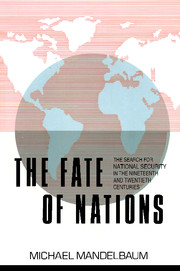Book contents
- Frontmatter
- Contents
- Acknowledgments
- A Note on Sources and Citations
- Introduction
- 1 Collective Approaches to Security: The Nineteenth-Century Managed Balance of Power System and Great Britain
- 2 France, 1919–1940: The Failure of Security Policy
- 3 The United States, 1945–1980: The Natural History of a Great Power
- 4 China, 1949–1976: The Strategies of Weakness
- 5 Israel, 1948–1979: The Hard Choices of the Security Dilemma
- 6 Collective Approaches: The International Economic Order and Japan, 1945–1985
- Index
2 - France, 1919–1940: The Failure of Security Policy
Published online by Cambridge University Press: 20 May 2010
- Frontmatter
- Contents
- Acknowledgments
- A Note on Sources and Citations
- Introduction
- 1 Collective Approaches to Security: The Nineteenth-Century Managed Balance of Power System and Great Britain
- 2 France, 1919–1940: The Failure of Security Policy
- 3 The United States, 1945–1980: The Natural History of a Great Power
- 4 China, 1949–1976: The Strategies of Weakness
- 5 Israel, 1948–1979: The Hard Choices of the Security Dilemma
- 6 Collective Approaches: The International Economic Order and Japan, 1945–1985
- Index
Summary
A major purpose of the European settlement after World War I was to keep France secure against Germany. The French were convinced from the very outset of the postwar period, correctly as it turned out, that Germany posed a continuing threat to their security. The Paris Peace Conference of 1919, at which the victorious powers met to devise the postwar settlement, was the beginning, not the end, of French efforts to remain secure. Over the course of the next twenty years France tried first to preserve the terms of the settlement against German efforts to overturn it, then to resist another German bid for mastery of Europe, and finally simply to protect itself against the German army. The French search for security was one of the principal themes of European and world history during the years from 1919 to 1940, and it involved each of the major strategies for remaining secure.
The French had paid a high price for the victory of 1918. Their losses over four years, in men and material, had been heavy. The war in the west had been fought almost exclusively on their soil. In crafting the settlement, the French were more urgently concerned with the arrangements in Europe than the other members of the victorious coalition because, unlike its allies – the United States and Great Britain – France was geographically part of the Continent.
- Type
- Chapter
- Information
- The Fate of NationsThe Search for National Security in the Nineteenth and Twentieth Centuries, pp. 72 - 128Publisher: Cambridge University PressPrint publication year: 1988



